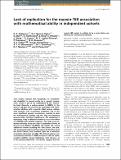Files in this item
Lack of replication for the myosin-18B association with mathematical ability in independent cohorts
Item metadata
| dc.contributor.author | Pettigrew, Kerry A | |
| dc.contributor.author | Fajutrao Valles, Samuelle F | |
| dc.contributor.author | Moll, Kristina | |
| dc.contributor.author | Northstone, Kate | |
| dc.contributor.author | Ring, Susan | |
| dc.contributor.author | Pennell, Craig | |
| dc.contributor.author | Wang, Carol | |
| dc.contributor.author | Leavett, Ruth | |
| dc.contributor.author | Hayiou-Thomas, Marianna E | |
| dc.contributor.author | Thompson, Paul | |
| dc.contributor.author | Simpson, Nuala H | |
| dc.contributor.author | Fisher, Simon E | |
| dc.contributor.author | Whitehouse, Andrew J O | |
| dc.contributor.author | Snowling, Margaret J | |
| dc.contributor.author | Newbury, Dianne F | |
| dc.contributor.author | Paracchini, Silvia | |
| dc.contributor.author | SLI Consortium | |
| dc.date.accessioned | 2015-04-08T10:31:02Z | |
| dc.date.available | 2015-04-08T10:31:02Z | |
| dc.date.issued | 2015-04-23 | |
| dc.identifier | 176256663 | |
| dc.identifier | 3ec17f49-00bb-484d-b70c-6b36663e39e2 | |
| dc.identifier | 25778778 | |
| dc.identifier | 84928304900 | |
| dc.identifier | 000353405000006 | |
| dc.identifier.citation | Pettigrew , K A , Fajutrao Valles , S F , Moll , K , Northstone , K , Ring , S , Pennell , C , Wang , C , Leavett , R , Hayiou-Thomas , M E , Thompson , P , Simpson , N H , Fisher , S E , Whitehouse , A J O , Snowling , M J , Newbury , D F , Paracchini , S & SLI Consortium 2015 , ' Lack of replication for the myosin-18B association with mathematical ability in independent cohorts ' , Genes, Brain and Behavior , vol. 14 , no. 4 , pp. 369-376 . https://doi.org/10.1111/gbb.12213 | en |
| dc.identifier.issn | 1601-1848 | |
| dc.identifier.other | ORCID: /0000-0001-9934-8602/work/60428074 | |
| dc.identifier.uri | https://hdl.handle.net/10023/6445 | |
| dc.description | SP is a Royal Society University Research Fellow. This specific study in the ALSPAC cohort was supported by a MRC grant to SP [grant number G0800523/8647]. Support to the analysis was provided by the St Andrews Bioinformatics Unit funded by the Wellcome Trust [grant 097831/Z/11/Z]. | en |
| dc.description.abstract | Twin studies indicate that dyscalculia (or mathematical disability) is caused partly by a genetic component, which is yet to be understood at the molecular level. Recently, a coding variant (rs133885) in the myosin-18B gene was shown to be associated with mathematical abilities with a specific effect among children with dyslexia. This association represents one of the most significant genetic associations reported to date for mathematical abilities and the only one reaching genome-wide statistical significance. We conducted a replication study in different cohorts to assess the effect of rs133885 maths-related measures. The study was conducted primarily using the Avon Longitudinal Study of Parents and Children (ALSPAC), (N = 3819). We tested additional cohorts including the York Cohort, the Specific Language Impairment Consortium (SLIC) cohort and the Raine Cohort, and stratified them for a definition of dyslexia whenever possible. We did not observe any associations between rs133885 in myosin-18B and mathematical abilities among individuals with dyslexia or in the general population. Our results suggest that the myosin-18B variant is unlikely to be a main factor contributing to mathematical abilities. | |
| dc.format.extent | 266966 | |
| dc.language.iso | eng | |
| dc.relation.ispartof | Genes, Brain and Behavior | en |
| dc.subject | Dyscalculia | en |
| dc.subject | Dyslexia | en |
| dc.subject | Genetic association | en |
| dc.subject | Cognitive abilities | en |
| dc.subject | Neurodevelopmental disorders | en |
| dc.subject | ALSPAC | en |
| dc.subject | R Medicine | en |
| dc.subject | RC0321 Neuroscience. Biological psychiatry. Neuropsychiatry | en |
| dc.subject | 3rd-DAS | en |
| dc.subject.lcc | R | en |
| dc.subject.lcc | RC0321 | en |
| dc.title | Lack of replication for the myosin-18B association with mathematical ability in independent cohorts | en |
| dc.type | Journal article | en |
| dc.contributor.sponsor | The Wellcome Trust | en |
| dc.contributor.institution | University of St Andrews. School of Medicine | en |
| dc.contributor.institution | University of St Andrews. Biomedical Sciences Research Complex | en |
| dc.identifier.doi | 10.1111/gbb.12213 | |
| dc.description.status | Peer reviewed | en |
| dc.identifier.grantnumber | 097831/z/11/z | en |
This item appears in the following Collection(s)
Items in the St Andrews Research Repository are protected by copyright, with all rights reserved, unless otherwise indicated.

